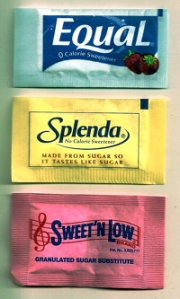Artificial Sweetener Disease (ASD) is sweeping across America, affecting tens of thousands of consumers, and Western medicine calls it anything but what it really is, so that doctors can prescribe expensive pharmaceuticals and set up “check up” appointments for the following weeks.
Call it recurring headaches, unbearable migraines, depression, anxiety, muscle pain, arthritis flare ups, buzzing or ringing in the ears, chronic fatigue, fibromyalgia, irritable bowel syndrome (IBS), Crohn’s disease, inflammation, even acid reflux, but don’t call it ASD, or the patient may stop consuming synthetic sweeteners, and then not schedule more doctor visits.
The symptoms of ASD can change overnight, depending on how much chemical sweetener you consume, and which ones. Some combinations are especially toxic. Consumers can go from a migraine headache to vomiting or from vision problems to an upset stomach. Many people experience central nervous system disorders, cramping, nervous twitches and abnormal reflexes.
The popular saying that “there’s not enough artificial sweetener in any specific product to cause health concerns” is a lie, especially now that in 2011 there are synthetic sweeteners in over 25% of all food, drink, gum and candy available. This cumulative effect has created ASD, and thanks to little or no regulation of chemical agents in food, it’s not going away anytime soon.
The good news is the cure for Artificial Sweetener Disease is absolutely free and involves no doctor, no health insurance co-pays, and has zero side effects. Here is the secret cure for ASD: throw away your sugar free gum and candy, and then trash all foods and drinks you have that are labeled “light” and “zero.”
Read the labels on everything, so you can filter out all artificial sweeteners from your products, including aspartame, sucralose, sorbitol, acesulfame-k, aspartic acid, and saccharine.
As an alternative to poisoning yourself, try Xylitol or Stevia in order to cut calories, or simply eat more organic vegetables! If problems persist, take a list of everything you ate this week to your Naturopath or Nutritionist to analyze. Remember, if you’re getting sick from moldy bread, don’t look for a prescription drug to cure you, just stop eating moldy bread.
Read (http://www.holisticmed.com/aspartame/) for more information.
https://www.facebook.com/healinghealthandwellness





